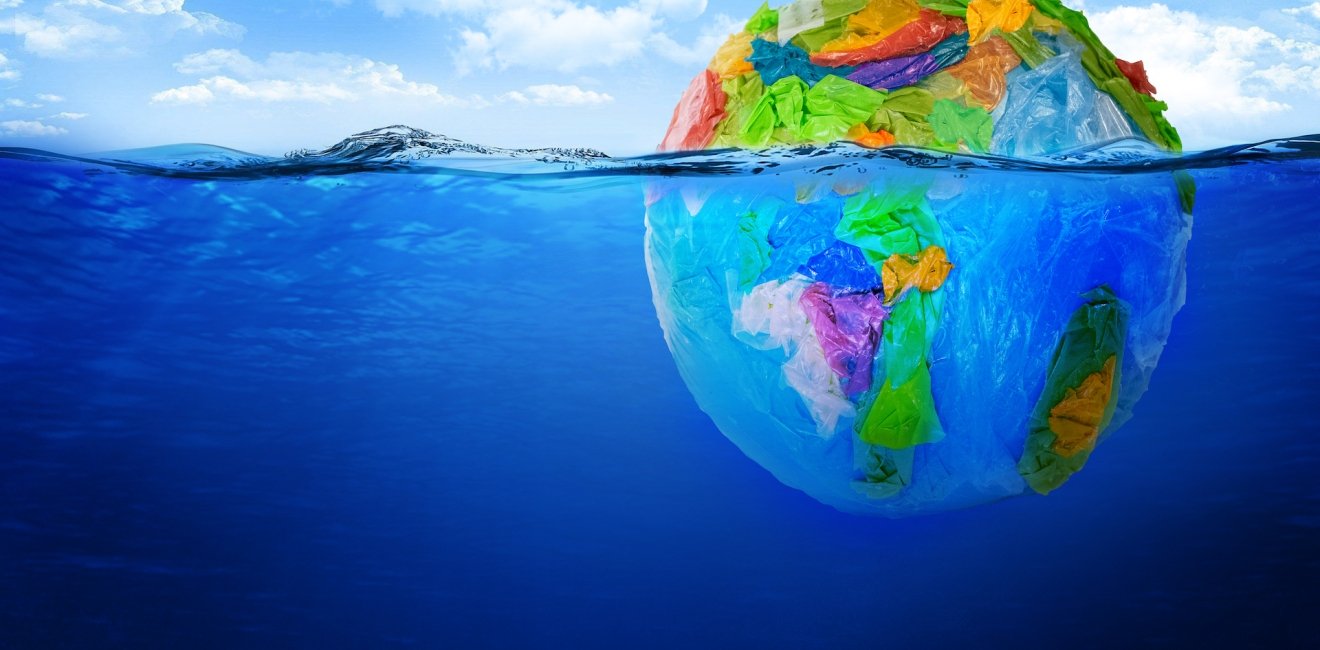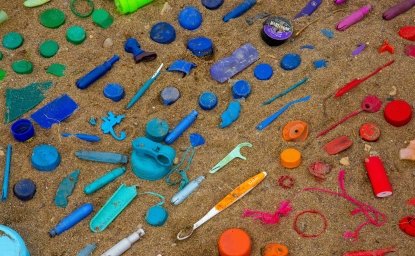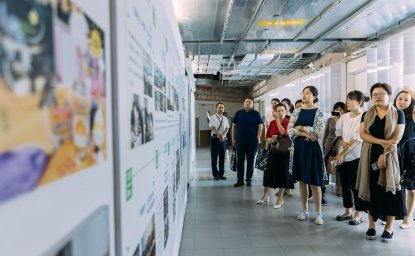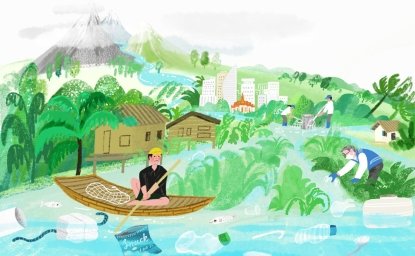Background: The Race to Complete the Global Plastic Treaty
Coordinated global action is imperative as single-use plastic production continues to explode and new studies confirm that this production has direct correlation to pollution according to Science Advances. Plastics also contribute to climate change throughout their lifecycle: fossil fuels are used in production and transportation, and when plastics degrade in landfills and in the environment, methane and ethylene are emitted. The fourth out of five scheduled Intergovernmental Negotiating Committee (INC) sessions for the Global Plastic Treaty took place from April 23-29. These Plastic Treaty sessions have aimed to create an “instrument” to address “the full life cycle of plastic, including its production, design and disposal”.
The INC’s timeline and set agenda were born from the fifth session of the UN Environment Assembly's Resolution 5/14, which set forth the mission and ambition of completing the negotiations by the end of 2024. The fourth meeting of the INC (INC-4) negotiations were attended by 2,500 delegates representing 170 Members and over 480 observing organizations, according to UNEP, and had the highest attendance and participation of any of the INC convenings yet, representing 88% of the world’s countries.
Part of the challenge in ending plastic pollution is determining how guidelines are implemented. The Paris Climate Agreement was criticized for relying on voluntary nationally determined contributions (NDCs) set by countries themselves, while also lacking accountability mechanisms. If the same approach is applied for the Global Plastics Treaty, some worry the treaty will be ineffective. The United States is supportive of binding obligations throughout the entirety of the plastic lifestyle, but also understands that tailored approaches for each country are necessary. There is no one-size fits all plan to tackle plastic pollution, but any form of success globally requires buy-in from major economies.
The speed and the scope of the treaty’s ambition along with the diverse needs across all of the stakeholders has made the negotiations challenging. During INC-4, country negotiators bracketed (red-lined) 3,700 issues of concern in the main text. Resolving or bridging these concerns make it difficult to achieve the goal of completing either the originally set ambitions of INC and/or the timeline. Despite the challenges, the Global Plastic Treaty has drawn broad participation as countries recognize the urgency of the plastic pollution problem. Conversations seeking common ground or ways to push forward through this process are critical now more than ever.
From the Roundtable
Hurdles and Brackets
When it comes to agreeing upon which obligations should be set in the global plastic treaty, G7 countries have collectively declared support for reducing global production and consumption of plastic polymers. The main target the instrument must address is the current overproduction and continuing trend of expanding plastic production, in order to effectively tackle the plastic crisis. However, a coalition of countries called the “Like-minded Countries,” Russia, China, and Saudi Arabia, major plastic-producing countries, are vehemently against upstream obligations and have blocked any treaty language that refers to it.
Because of these red lines set by the group, the decision-making process was hindered at INC-4. When consensus cannot be reached, voting is typically allowed to push the decision-making process. The big upset at the INC-4 was that some countries refused to use voting as a means to progress, effectively creating a veto power which prevented compromise. This is where the brackets multiplied. The use of red-lining was so extreme that some counties brought up the need to resolve the misuse of voting practices as a central issue to be addressed while giving their closing statements.
Countries that are a part of the “High Ambition Coalition” called for strong proposals on production-stage obligations and see opposition to this issue as an obstacle that must be addressed before moving forward with negotiations. According to a report from CIEL, 196 fossil fuel and chemistry industry lobbyists registered for INC-4. This was a 37% increase from INC-3, raising concerns that the increased presence of lobbyists disrupted the parallel tracks businesses and NGOs were pursuing towards minimizing plastic production. Some criticized the presence of plastic industry lobbyists as contributing to these voting practices, which delayed planning for intersessional work and freezing negotiations. The standstill was only broken when language regarding upstream obligations were eliminated. Many were disappointed that upstream obligations were taken off the table.
Simultaneously, there are countries trying to move negotiations forward by arguing against one-size-fits-all solutions. This could resolve the difficulty of coming up with a single, and perhaps diluted, set of next steps. Instead, countries could be allowed to take a tailored approach, akin to the Paris climate agreement, that has parallel and differentiated obligations and progress on reining in plastic pollution. Further, the issue of plastic pollution and its effects are not static, therefore the finalized instrument must be dynamic in ability to adapt as more research and impacts of plastic pollution come to light.
The Final Sprint: Will INC-5 Meet the Ambitions and/or the Timeline?
A recurring concern emphasized by the members of the roundtable was whether the comprehensive instrument would be completed by the end of INC-5 held in Busan this December. There were several considerations regarding how this final sprint could work.
- If meeting the original timeline, wrapping up INC-5 with the finalized tool becomes the most agreed upon priority. Would the instrument be fully comprehensive? Furthermore, how long would it take the same number of government attendees to agree to reconvene for another negotiation about plastic if more still needed to be done?
- If the timeline for the completion of the tool was extended, would it be beneficial? Or would it spark various stakeholders to pull out from the agreement all together? While there have been suggestions to extend the deadline, some countered that when a deadline is set, you have the most amount of leverage in terms of collective pressure to complete the instrument.
- Not focusing on the question of ambition or timeline at all, another option is instead focus as much of the conversation around achieving as much consensus as possible.
Possible Running Start for the INC-5: New Legal Drafting Group
In order to try to cover the most ground to reach the original goals in terms of both timeline and content, a legal drafting group was created. This technical group is not a negotiating body. The group consists of lawyers, with a subgroup from the government, that will go through all of the outputs from INC-4 and refine them. The addition of this group will hopefully give INC-5 a running start in finalizing the text.
Where will the legal drafting group start its work? Most vital for the group will be to first tackle the points of consensus from INC-4. The next steps will be sending the refined language to the legal bodies and then identifying policy questions that are unclearly addressed in the language as stands.
Outside Action on Global Plastic
Outside of the global treaty, countries are still making their own efforts to reduce plastic waste on a smaller scale.
-
Five G7 countries (Canada, France, Germany, Italy, and the United Kingdom) and the European Union signed an Ocean Plastics Charter in 2018 to work towards designing all plastics to be 100% reusable, recyclable, or recoverable by 2030.
-
China and Germany are working closely together via the Sino-German Environment Forum to address plastic pollution and circulatory.
-
The Indonesia-Australia Comprehensive Strategic Partnership mentions strengthening cooperation to manage solid waste and marine plastic debris via the Australia-Indonesia Systemic Innovation Lab on Marine Plastic Waste.
-
Following a meeting between Prime Minister Narendra Modi and President Emmanuel Macron in 2023, India and France released a joint commitment to eliminate single-use plastics pollution, incorporating a ban on single-use plastics.
Though smaller group and bilateral approaches to tackling plastics pollution indicate buy-in from certain countries, coalitions of countries cannot act alone to address a problem that ignores borders and boundaries. The issue of plastics pollution is increasingly visible and concerning to citizens around the world who demand stakeholders and governments take action with coordinated, comprehensive solutions. Advocates for a strong global plastics treaty seek binding obligations for signatory countries, minimum recycled content mandates, increased investment in waste management infrastructure, and, most importantly, a reduction in plastic production and waste from cradle to grave.
The Wilson Center will continue to produce more plastic pollution blogs, policy reports, webinars and closed conversations on the plastic treaty and plastic action in China, SE Asia and the United States. We also will be expanding our work to disseminate our award-winning Plastic Pipeline educational video game.
If you would like to stay engaged in future conversations around plastics please reach out to Jennifer Tunner, PhD, jennifer.turner@wilsoncenter.org. To stay engaged with conversations about serious games, in education or beyond, please reach out to Elizabeth M H Newbury, PhD, at Elizabeth.Newbury@wilsoncenter.org.











